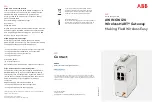
Security Gateway Manual
SG-2100
12.6.2 Isolated
In an isolated local network, hosts on the network cannot contact hosts on other networks unless explicitly allowed
in the rules. Hosts can still contact the Internet as needed in this example, but that can also be restricted by more
complicated rules.
This scenario is common for locked down networks such as for IOT devices, a DMZ with public services, untrusted
Guest/BYOD networks, and other similar scenarios.
Warning:
Do not rely on tricks such as using policy routing to isolate clients. A full set of reject rules as described
in this example are the best practice.
Create RFC1918 alias or alias containing at least the local/private networks on this firewall, such as VPNs. Using all
of the RFC1918 networks is a safer practice
• Navigate to
Firewall > Aliases
• Click
Add
• Configure it as follows:
Name
PrivateNets
Description
Private Networks
Type
Network(s)
• Add entries for:
–
192.168.0.0/16
–
172.16.0.0/12
–
10.0.0.0/8
• Click
Save
• Navigate to
Firewall > Rules
, on the
OPTx
tab (or the custom name)
Add rule to pass DNS to firewall (or other DNS servers)
• Click
to add a new rule at the bottom of the list.
• Configure the rule as follows:
Action
Pass
Interface
OPTx
(or the custom name)
Protocol
TCP/UDP
Source
OPTx Net
(or the custom name)
Destination
This Firewall (self)
If clients are to use DNS servers other than the firewall, use those as the destination instead.
Destination Port Range
DNS
, or choose
Other
and enter
53
To allow DNS over TLS as well, add another rule for DNS over TLS or port
853
.
Description
Text describing the rule, e.g.
Allow clients to resolve DNS through
the firewall
© Copyright 2022 Rubicon Communications LLC
61








































